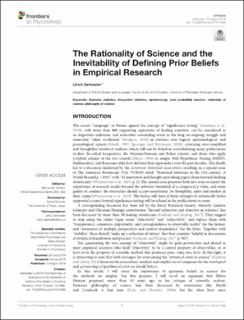The Rationality of Science and the Inevitability of Defining Prior Beliefs in Empirical Research
Peer reviewed, Journal article
Published version
Permanent lenke
https://hdl.handle.net/11250/3048243Utgivelsesdato
2019Metadata
Vis full innførselSamlinger
Originalversjon
Dettweiler, U. (2019). The rationality of science and the inevitability of defining prior beliefs in empirical research. Frontiers in Psychology, 10, 1866. 10.3389/fpsyg.2019.01866Sammendrag
The recent “campaign” in Nature against the concept of “significance testing” (Amrhein et al., 2019), with more than 800 supporting signatories of leading scientists, can be considered as an important milestone and somewhat resounding event in the long on-ongoing struggle and somewhat “silent revolution” (Rodgers, 2010) in statistics over logical, epistemological, and praxeological aspects (Meehl, 1997; Sprenger and Hartmann, 2019), criticizing over-simplified and thoughtless statistical analyses which still can be found in overwhelming many publications to-date. So-called frequentists, the Neyman/Pearson and Fisher schools, and those who apply a hybrid scheme of the two schools (Mayo, 1996) or simple Null Hypothesis Testing (NHST), likelihoodists, and Bayesians alike have debated their approaches over the past decades. This finally led to a discourse facilitated by the American Statistical Association, resulting in a special issue of The American Statistician (Vol. 73/2019) titled: “Statistical Inference in the 21st century: A World Beyond p < 0.05,” with “43 innovative and thought-provoking papers from forward-looking statisticians” (Wasserstein et al., 2019, p. 1). The special issue proposes both new ways to report the importance of research results beyond the arbitrary threshold of a categorical p-value, and some guides of conduct: the researcher should accept uncertainty, be thoughtful, open and modest in their claims (Wasserstein et al., 2019). The future will show if those attempts to statistically better supported science beyond significance testing will be echoed in the publications to come.

